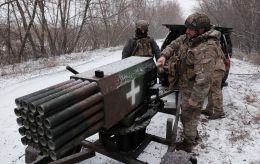'No NATO here, I'm a bricklayer from Denmark': Why foreigners fight for Ukraine and what they say about Russians
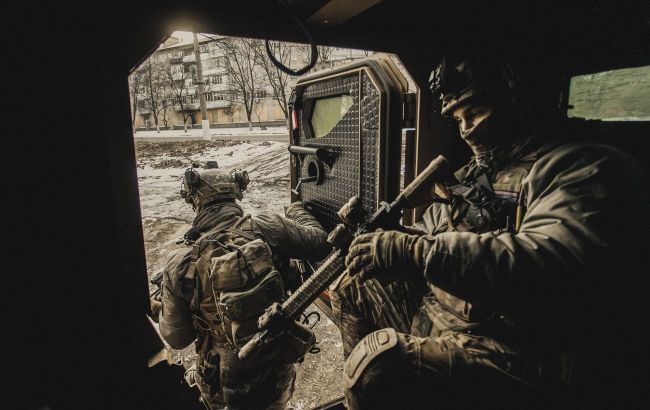 Fighters of the International Legion of Ukraine's Defense Intelligence (photo: instagram.com/international_legion_diu/)
Fighters of the International Legion of Ukraine's Defense Intelligence (photo: instagram.com/international_legion_diu/)
Thousands of volunteers from many countries expressed their desire to help defend Ukraine after Russia's full-scale invasion. Many fighters had no military experience. Foreigners who wanted to join the Ukrainian Armed Forces were gathered in the International Legion, supervised by Ukraine's Defense Intelligence. RBC-Ukraine spoke with two Legion fighters who came to Ukraine from Norway and Denmark
We met the guys on the Zaporizhzhia front. All were friendly and communicative. At the unit's permanent location, many flags of the home countries of the International Legion fighters are displayed.
We first sat down next to the Norwegian flag and began our conversation with a fighter with the call sign Basket.
– Who were you in your previous life before coming to Ukraine and before the war?
– I'm from Norway. Before coming to Ukraine, I was just a civilian. In Norway, I didn't have any military experience. We can serve for up to a year, but not everyone gets selected. I wasn't. I worked in construction, operated heavy machinery and equipment for seven years, and lived an ordinary life: worked, spent time with friends, worked again. Then I decided to come here and changed my whole life.
– What was your reaction when you saw the news about the war in Ukraine?
– I followed events from the very beginning when reports said that an invasion might happen soon. So, I started reading more, and I continued to follow the situation when it happened. I saw this was not a war between militaries but Russia's war against Ukrainian civilians and the rest of the world.
I first came to Ukraine in March 2022 because I decided I could help somehow. It didn't necessarily have to be something military, but I knew I would find a way to contribute. I came right after Zelenskyy called for anyone who could come and help. I tried to join the military. I first went to Poland, where I met many people from all over the world who were heading here with the same intentions - to help and join the Legion.
I decided to try joining them. But to be in the army, you needed combat experience and military training. Since I didn't have that, I wasn't accepted. I stayed for another three weeks and helped in other areas - humanitarian aid and similar work. Then I returned home but kept in touch with the people I met here. I continued to follow the war.
In February-March 2023, a few guys I met earlier were heading back to Ukraine, saying they were rejoining the Legion as Ukraine was recruiting more people, even civilians, if they met the criteria.
– Weren't you afraid to join the army?
– During training, I realized I had mastered the basics of soldiering well. So, I wasn't scared. But then, as we got closer to the moment when we were ordered to attack a Russian position, I thought, "I don't know if I can do this." I could have just stayed back and continued training. But they told me, "No, you'll do great." I wasn't sure. Others were saying, "We're ready, let’s go, let's kill people," and I was like, "I'm not sure this is for me." But I tried. When we entered the operational zone, we were on site within 48 hours, advancing toward the Russian position we were tasked to capture. As soon as the Russians saw us, they opened fire with everything they had.
Hell broke loose. I hit the ground, terrified, not knowing what to do. My commander, whom I had grown close to during training, was behind me and said, "You have to crawl." I replied, "No, I'll stay here; it's safer. I'm behind a small hill and not moving." He said, "You have to move. You need to see the enemy. If you don't move, you'll die." I resisted: "No, no, I'm staying put." Then he yelled, "Damn it, move, or I'll hit you." I realized he wasn’t joking. So, I crawled those three meters. He asked, "What do you see?" I replied, "I see two Russians."
I killed them. We engaged in battle. Although we couldn't take the position, we captured much more territory than we thought possible.
After that first battle, when things calmed down, we assessed our losses, and the Russians assessed theirs. I calmed down and realized everything went fairly well. It was terrifying, but you get used to it at some point.
That first battle determines whether military service is for you or not. Some with more training and experience than I had said after that battle, "No, this isn't for me; I'm going home." So much depends on your mental state and whether you can handle it.
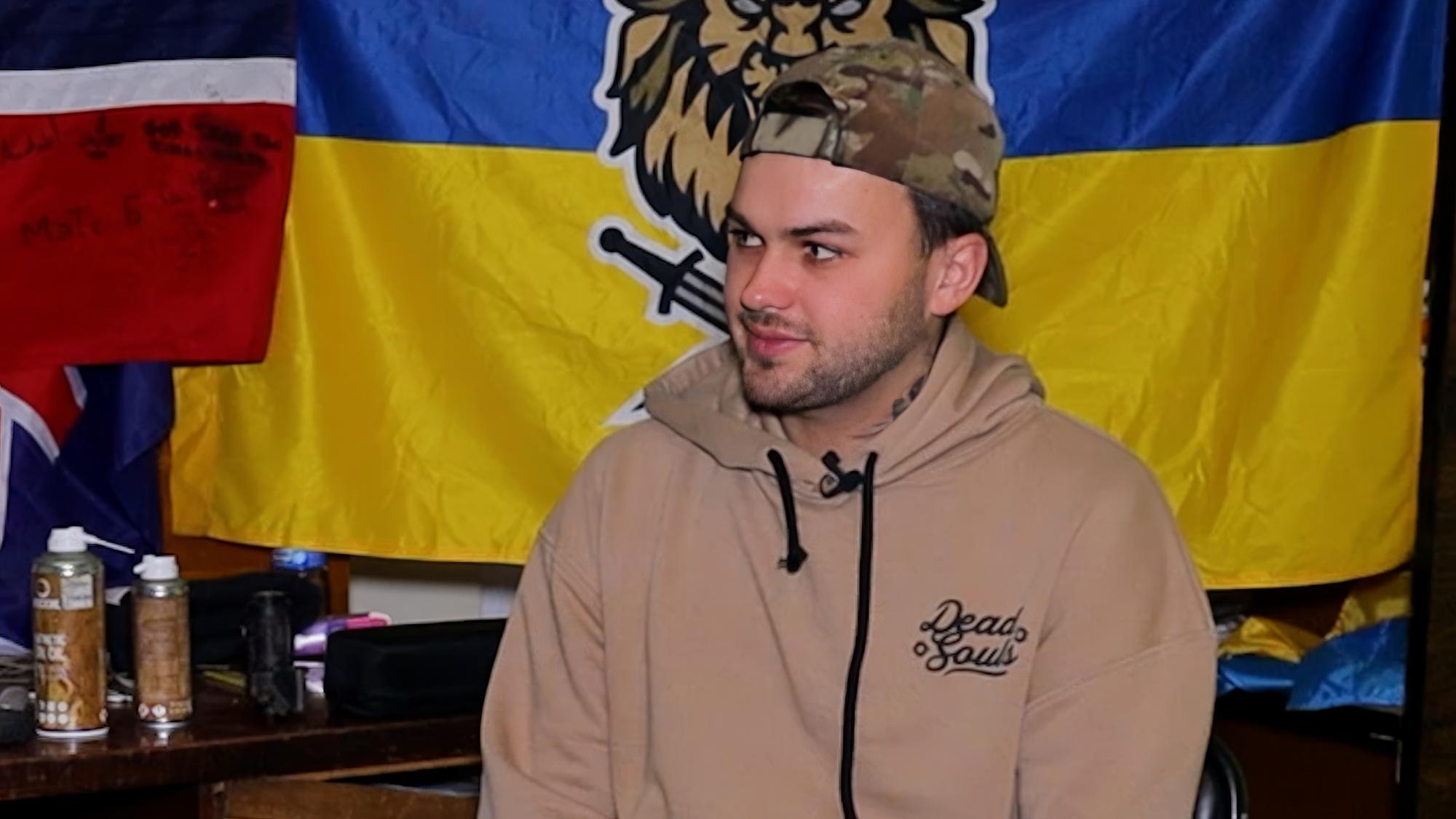 Basket fighter (photo: RBC-Ukraine)
Basket fighter (photo: RBC-Ukraine)
– After that, did you feel like going home?
– No, not really. Only the first ten minutes were the scariest. Once you gain control over the situation, you learn to recognize when shells are coming your way and get used to mines and artillery. I understood that survival under artillery and mines was 50/50, but compared to the Russian soldiers, I knew we were stronger.
I knew I had to help. I couldn't quit after one bad fight. I had to keep going. So no, I didn't even consider going home. I knew why I came and what I had signed up for, and I was ready to do it.
– Did you understand that Russia is the aggressor when you learned about the war in Ukraine? People abroad often don't fully grasp who's in the wrong.
– I understood that Russia is the aggressor. Russia is wrong. I didn't know much about Ukraine or its history with Russia before the war. But then, when I started reading about 2014, I realized I had to help because I could. Why should I sit in Norway and watch this happen when I can make a difference? I didn't know I would serve in the army, but when I was offered the chance, I said, "Okay, I'll try." Because I knew I could do something useful. I'm protecting civilians and innocent people, protecting Ukraine. If they (Russians - ed.) take Ukraine, they won't stop. They'll definitely move further; everyone says it and knows it. That's why I understood that I wasn't just defending Ukraine and its people but all of Europe. As one soldier, I can do more here than someone sitting in Norway just promising help. I had to show that I'm ready to help and make a difference. It's better to try than just talk and not try.
– Ukrainians cannot break their contracts once they've signed. What about you foreigners?
– Earlier, you could break your contract and go wherever you wanted, change battalions, or whatever. But now, no, that's no longer possible. Now, you have to serve a minimum of six months, and you can't break the contract during those six months. Nowadays, most people who join know what they're signing up for. If they want to join our team, we always tell them they must serve six months. They understand this and are ready. So, more and more soldiers who joined later during the war stayed long-term, unlike at the beginning when people just wanted to come for three weeks or three months. Now, they're here for the long haul.
– How long have you been here?
– I've been here almost two years. In March, it will be two years.
– You could have stayed for six months, but now it's been two years. How much longer do you plan to stay?
– Until victory!
– Until victory? That could take many years.
– Yes, then we'll just keep working. We can't just give up because it gets harder. Ukrainians can't give up, so why should I? I came to help; I can’t just go home because of a bad day on the front line. I came to serve for a purpose - for the people of Ukraine. I can’t just quit out of fear.
– Do you have communication problems with Ukrainians? A language barrier?
– When I'm not on the front line, communication is indeed a problem because not everyone speaks English, and I don't know much Ukrainian. But on the front line, we don't need to talk much. We understand each other. Even if a Ukrainian soldier wants to say something to me in Ukrainian, I understand. And they understand me when I explain in English. We just seem to think alike in many situations. So, we always find a way to understand each other, especially when we spend more time together and get used to one another.
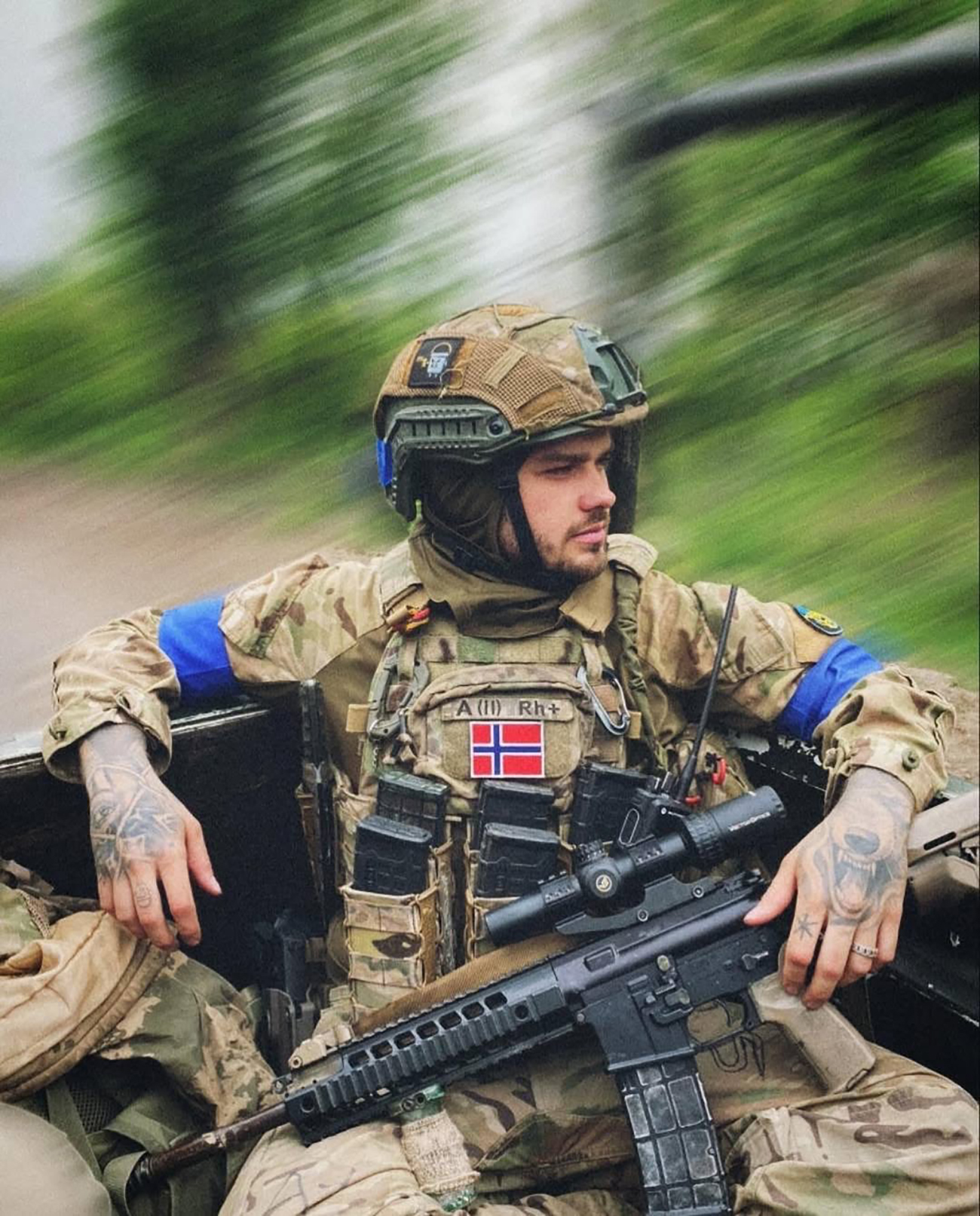 Photo: provided by "Basket"
Photo: provided by "Basket"
– What, in your opinion, does Ukraine need to stop the Russians? To end the war and take back our occupied territories?
– Artillery, mortar systems. That's what we always lack. But also soldiers. Sure, we have foreigners coming to help. Ukrainians are coming to help too. But it's still not enough. We need more trained soldiers because many drafted soldiers received minimal training and were then sent to the front. That doesn't help the guys already there much because they go out without knowing what to do. So, we need more weapons, more trained soldiers, and better defensive lines since we're in a defensive situation now. Across the front, defensive lines could always be improved. There's always room for improvement, and it's crucial.
– Many people abroad believe the war could be stopped if Ukraine gives up all the occupied territories to Russia. Then Russia will stop. Do you think that's possible?
– The Western world thinks that's how it will be. But in reality, the Russians will just dig in, strengthen their positions, and, in a few years, attack again. So that's not an option. I think most Ukrainians feel the same because it happened in 2014. It will happen again. They'll just rebuild everything and attack again. They won't stop.
– Have you ever thought about staying in Ukraine after the war?
– Yes. After the war, there will still be much work to do. Cities need to be rebuilt where possible. Help is needed. We might need to stay and prepare for the next invasion, even if the war freezes. So, we can’t just leave. We can help rebuild cities and keep working in the army.
***
Another Legion fighter came to Ukraine from Denmark, and like his brother-in-arms, he lived a regular civilian life.
– Back home, I worked as a bricklayer before coming here. About five years before I came to Ukraine, I had served my mandatory military service in the Danish army. That was all my military experience before arriving here.
– Why did you decide to come here, and when was that?
– I came here in the summer of 2023. One of the reasons was that I watched the Netflix documentary Winter on Fire. I was deeply impressed by how people were willing to continue resisting in the capital, to keep fighting because they didn't want to be part of a Russian puppet state. They wanted to be a separate nation, to have their own flag and their own democracy. And they were ready to give everything they had, even when they were attacked with automatic weapons and had only makeshift barricades. It was incredibly inspiring to see the determination to preserve what's yours, to defend your country, and the willingness to fight for it. That had a profound impact on me.
Later, when the full-scale war started, and I saw the bombing of the maternity ward in Mariupol, when I saw the footage of a pregnant woman being carried out – that's not a military target. The Russians didn't come to "liberate," as they claimed in their so-called three-day special operation. They came to destroy people. They harm civilians. That deeply angered me. I saw the abduction of Ukrainian children who, as we know, are taken to Russia for adoption. Their passports and documents are altered to make it seem like they were born in Russia. That's wrong. It struck me deeply.
When the full-scale war began, I saw a lot of footage of events here. But initially, I told myself that they (Ukraine - ed.) needed people with proper military training and combat experience. I wasn't that kind of person. But after a year of observing Ukrainians' readiness to resist and their ability to adapt to the situation they were in, I realized I had to come. I would come and fight. And that's a terrifying choice. But I told myself: either I stay silent and stop yelling at the screen at home or do something. And I decided to act.
– How long did you prepare for military service in Ukraine?
– Since I had some training back home in Denmark, I spent a short time in the Lviv region before being transferred to the second battalion of the International Legion. There, I received additional training, particularly on the weapons I would have to use. From the time I arrived in Ukraine to when I got to the front line, about a month and a half passed, including transfers between various locations.
– When you came here and saw the destruction in Ukraine, villages completely wiped out, what did you feel?
– I was shocked. For many years, we've been able to see war footage online. Still, it doesn't compare to driving through one of these villages, where there used to be a happy community, and now there are burnt-out buildings, burning cars, and houses that no longer exist or are completely destroyed. It leaves an impression; it's entirely different. It's both sad and inspiring because you mourn for the happy, peaceful people who once lived here, but it also motivates you to go out and fight so that the destruction you see on the front line doesn't spread further.
– What was the first frontline area you reached?
– That was probably in the Luhansk region. I arrived there with the second battalion of the International Legion. For me, it was defensive operations. I had to take a position in the trenches, where the distance between us and the Russians didn't exceed 100 meters. And in some positions, where the trenches were dug closer, the distance was less than 50 meters. We could clearly see their trenches day and night. If you looked closely, you could see people walking, the tops of their helmets. That was the first mission I was sent on.
– Were you scared?
– It was a mix of fear and, I don't know, a bit of excitement because I was already there and doing what I had set out to do. The reality was terrifying because you know that one direct hit from an artillery shell is all it takes. But at the same time, you feel like you're in the right place, doing your mission, which many people spend their whole lives looking for. That's exactly how I felt when I got there: I was right where I was meant to be.
– In our world, there are rules of war. But have you noticed that the Russians don't follow these rules?
– Absolutely. They have no respect for any rules of engagement or laws of war developed over the years. They don't care. Whether it's a military target or a civilian one, it doesn't matter to them. If they can achieve a successful strike, they'll show it on their media and say, "Look how successfully our army acted." For them, there's no concept of defeat, only victory. By any means – that's their principle.
– Why do you think Russia invaded our country?
– Many of it can be traced back to 2014, during the elections. Putin lost his puppet (former Ukrainian President Viktor Yanukovych - ed.). He lost control of what he considered a buffer between him and the rest of Europe. That's when he realized he could no longer control these people through puppets or bribing politicians. Now, he had to invade to gain total control over the country. I think he was frightened by losing that control, and suddenly, people began to stand up against the "great Russian bear" we were always told about as kids. And now he's trying to suppress it. So, I think it happened because of his fear of how things were developing in the West and because he no longer had the control he once had.
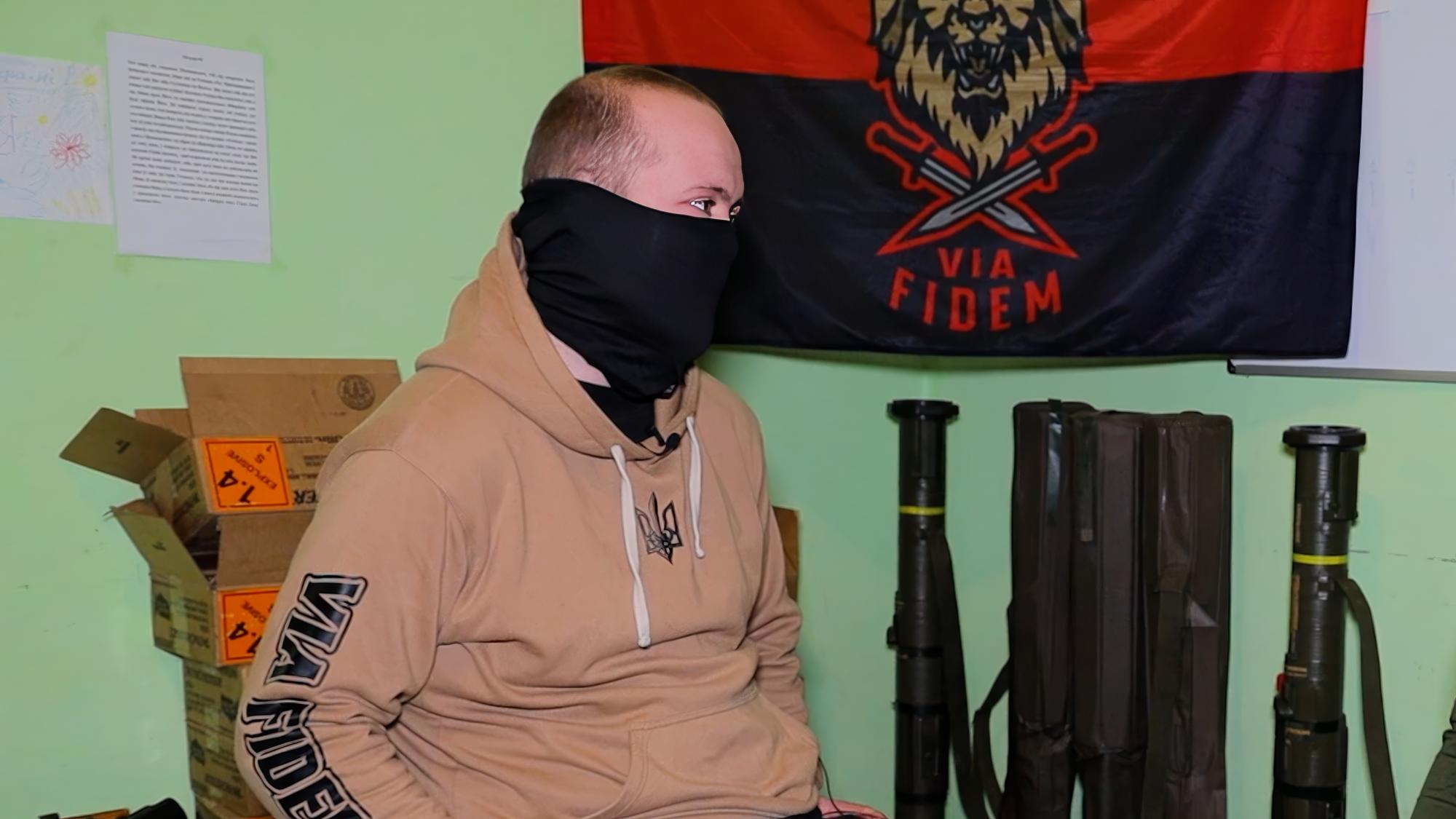 A fighter from Denmark (photo: RBC-Ukraine)
A fighter from Denmark (photo: RBC-Ukraine)
– Russians always say that NATO soldiers and foreign military personnel are fighting in Ukraine. When they saw Europeans on the front lines, what was their reaction?
– Russians always react strangely to the presence of foreigners in the area, especially when we're in the forest. They heard us speaking English, and we shouted at them in English. I think many of them were convinced that they were indeed fighting NATO. So, when they heard these English voices, they started shouting, "Am I fighting NATO?" I replied, "No, I'm just an ordinary bricklayer from Denmark with a rifle. There's no NATO here, calm down." They're convinced they're fighting the entire NATO armed forces right now. But that's not the case. If it were, the situation would be entirely different.
– Is Russia an enemy only for Ukraine or for the whole world?
– They're definitely enemies of the entire West. People don't realize how crucial Ukraine is for the rest of Europe. Ukraine is the heart of Europe. And you could feel it back home as soon as Ukraine was attacked. And Russia knew it, too, when they started their aggression. It's a fight, and if we lose Ukraine – God forbid – the enemy will be at our doorstep.
– We hope that this will not happen, but if they take Ukraine, what do you think will happen next? Will they go to Poland and other countries?
– The Ukrainians have done an incredible job of gradually breaking up what was once the Russian army. So, no, I don't think they will go any further. But I do think that over time, there could be a greater threat to us. And that's why it's important to fight now.
Maybe not right away, but over time, there could be a next step. He (Putin, - ed.) has taken Chechnya, part of Georgia, Crimea. Now, he's trying to take Ukraine. He's already successfully made Belarus his puppet. He's gradually building up his power, and we in the West are ignoring all of this.
– What surprised you most when you came to Ukraine?
– I was very surprised by the people. They are incredibly welcoming and warm. They laugh a little when I approach and try to talk to them because my Ukrainian is almost zero. They laugh, but at the same time, they try to help – amazing people. For example, at my first base, while waiting to be deployed with the second battalion, an elderly woman was working where we washed and did our laundry. Once, I left my T-shirt to dry, and she saw it had a hole in it. When I came to pick up my things the next day, she had sewn it up and said, "Here you go, welcome to Ukraine." It's just incredible – such kind and caring people who understand I'm struggling to adjust here and help however they can.
– What would you say to others who want to join the Ukrainian army, help soldiers, civilians, or participate in humanitarian missions but are afraid?
– Definitely think twice before coming here. I'm not saying don’t come, but make sure you clearly understand your values, what truly motivates you, and why you want to be here. Whether it’s humanitarian aid, stabilization points, or frontline service – I encourage you to listen to your feelings, the drive that makes you say, "I want to help." Just ensure you know your reason. But if you feel it's your calling – come and help because we really need help.

